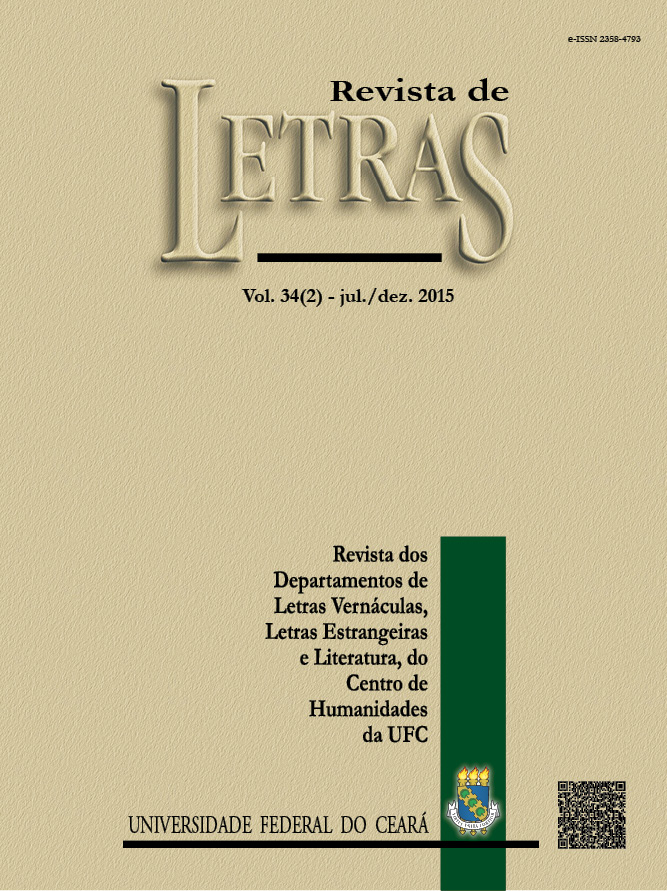ANÁLISE DESCRITIVA DOS ASPECTOS LINGUÍSTICOS QUE PREJUDICAM A INTERCOMPREENSÃO DOS ALUNOS ESTRANGEIROS DA UNILAB NO GÊNERO COMENTÁRIO / Descriptive analysis of the linguistic aspects that undermine the intercompreension of foreign students of the unilab on text of genre comment
Resumo
RESUMO
A maioria dos estudantes oriundos dos países africanos de língua oficial portuguesa (PALOPs) e do Timor-Leste tem muita dificuldade no processo da intercompreensão, pois, apesar de ser a língua oficial de seus países, o português não é a sua língua materna. Assim, o problema a ser abordado é “Quais fatores linguísticos prejudicam a intercompreensão dos estudantes africanos e timorenses no âmbito da UNILAB?”, tendo em vista que eles possuem muita dificuldade em se comunicar por causa do modelo de ensino do português adotado em cada país, que geralmente só é falado dentro da sala de aula. Dessa forma, esta proposta objetiva analisar os aspectos linguísticos que prejudicam a intercompreensão dos alunos estrangeiros da UNILAB de modo a possibilitar a análise descritiva, sob o panorama dos aspectos morfossintáticos, semântico-pragmáticos e discursivos da língua portuguesa, numa visão sociolinguística e discursiva, visando a uma discussão da política linguística para o português. A abordagem teórica está fundamentada nas pesquisas de Calvet (2007), Orlandi (2007), Cahen (2010) e Neves (2012), dentre outros, que nos fazem refletir sobre o estatuto da língua portuguesa na comunidade lusófona. Os dados foram coletados a partir da análise linguístico-discursiva dos comentários escritos de vinte e três estudantes guineenses, constituídos a partir do corpus do grupo de pesquisa Interlusofonia. Palavras-chave: intercompreensão; língua portuguesa; política linguística.
ABSTRACT
Most students from the Portuguese-speaking African countries (PALOP) and East Timor have great difficulty in the mutual understanding process because, despite being the official language of their country, the Portuguese is not their mother tongue. Thus, the problem to be addressed is “What linguistic factors undermine the mutual understanding of African and East Timorese students under UNILAB?”, Given that they have great difficulty in communicating because of the Portuguese education model adopted in each country, which is usually only spoken in the classroom. Thus, this proposal aims to examine the linguistic aspects that undermine mutual understanding of foreign students UNILAB to enable the descriptive analysis under the panorama of morphosyntactic aspects, semantic-pragmatic and discourse of the Portuguese language, a sociolinguistic and discursive vision, aiming a discussion of language policy for the Portuguese. The theoretical approach is based on research Calvet (2007), Orlandi (2007), Cahen (2010) and Neves (2012), among others, that make us reflect on the status of the Portuguese language in the Portuguese-speaking community and the data were collected from the linguistic-discursive analysis of the reviews written twenty three Guinean students, made from the Interlusofonia research group corpus. Keywords: Intercompreension; Portuguese language; Language policy.
Downloads
Downloads
Como Citar
Edição
Seção
Licença
Autores que publicam nesta revista concordam com os seguintes termos:- Autores mantêm os direitos autorais e concedem à revista o direito de primeira publicação, com o trabalho simultaneamente licenciado sob a Licença Creative Commons Attribution que permite o compartilhamento do trabalho com reconhecimento da autoria e publicação inicial nesta revista.
- Autores têm autorização para assumir contratos adicionais separadamente, para distribuição não-exclusiva da versão do trabalho publicada nesta revista (ex.: publicar em repositório institucional ou como capítulo de livro), com reconhecimento de autoria e publicação inicial nesta revista.
- Autores têm permissão e são estimulados a publicar e distribuir seu trabalho online (ex.: em repositórios institucionais ou na sua página pessoal) a qualquer ponto antes ou durante o processo editorial, já que isso pode gerar alterações produtivas, bem como aumentar o impacto e a citação do trabalho publicado (Veja O Efeito do Acesso Livre).

.png)





.png)
